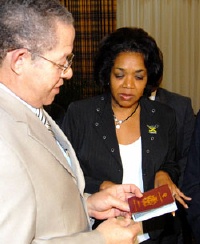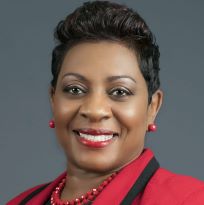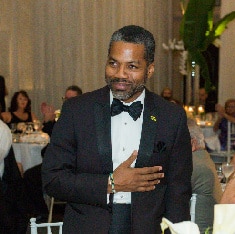Jamaica’s Foreign Affairs Minister endorses CARICOM Passport
KINGSTON, Jamaica – Jamaica’s Minister of Foreign Affairs and Foreign Trade, Dr. Kenneth Baugh, has said that the introduction of the Jamaican CARICOM passport is an initiative that reinforces the country’s commitment to Caribbean integration.
“The CARICOM passport is a welcome initiative because it has been long awaited. This is something that strengthens our Caribbean community, it’s a further indication of the integration of CARICOM,” he said in an interview with JIS News, at the handing over of the first Jamaica CARICOM passport to Prime Minister, Bruce Golding.
With the Caribbean Community moving towards a Free Trade Area, Dr. Baugh said that the CARICOM passport serves as a means to promote intraregional tourism through hassle free travelling for Caribbean nationals between CARICOM member states.
“One of the most important things in terms of establishing a Free Trade Area, is that if we were to move to a common market, (which we are now in a single economy) one of the aspirations is the free movement of people. This passport will give you that privilege as people can now take up their personal interest in different territories,” he articulated.
Dr. Baugh further advised that Jamaica has already put in place measures to eliminate any possible delays that persons are likely to face while travelling across the region.
“You have some countries that have not moved very fast and as a consequence people have difficulty moving around, they find themselves subject to delay. We in Jamaica have moved very far in terms of putting in the legislative measures to make sure that everything is okay and other countries have done so as well. We are hoping that we can now iron out those difficulties to ensure that there is easy and free movement of all nationals in the Caribbean from one territory to another,” he added.

Prime Minister Bruce Golding of Jamaica listens attentively to Chief Executive Officer (CEO) of the Passport, Immigration and Citizenship Agency (PICA), Jennifer McDonald, as she explains to him the features of the CARICOM passport.
Turning to international trade and economic issues, Dr. Baugh emphasised that although CARICOM member states are independent they cannot afford to be isolated.
“The world is no longer like that, you can’t be isolated anymore, although we may be independent in terms of geo-political nature, in terms of our territory as a small country. But in terms of economy and trade relations we cannot do without becoming a part of larger arrangements not only as the CARICOM territory but even in the region to enter into trading and economic co-operations with other countries in this part of the hemisphere,” he said.
Continuing, the Foreign Affairs Minister stressed that “the larger the population, the larger the market place, the better the income and the more we will derive from it in terms of benefits and our trading. This is also good for our manufacturers and exporters”.
He also opined that, “What we have to do now is develop the discipline of creative and productive industries to have goods and services to export so that we can benefit in a real way from these relationships. We can’t continue to look at ourselves as 2.7 to 3 million people and think that we are going to cater for that market place. That cannot hold anymore”.
“We would not be competitive at all, we have to look for larger market places and we have to develop a new discipline, an outward looking [approach where we] try to embark on processes that can take us into these other markets in terms of our goods and services,” he added.
Regional Heads of Government agreed on the introduction of the CARICOM Passport as a defining symbol of regionalism. In January 2005 Suriname was the first member state to issue the CARICOM Passport. Belize is the only member state yet to introduce the document.


